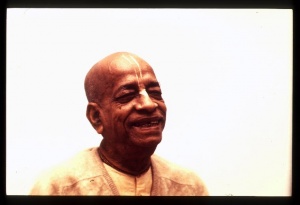CC Madhya 9.47: Difference between revisions
m (1 revision(s)) |
(Vanibot #0054 edit - transform synonyms into clickable links, which search similar occurrences) |
||
| (One intermediate revision by one other user not shown) | |||
| Line 1: | Line 1: | ||
{{ | [[Category:Sri Caitanya-caritamrta - Madhya-lila Chapter 09|C047]] | ||
<div style="float:left">'''[[Sri Caitanya-caritamrta|Śrī Caitanya-caritāmṛta]] - [[CC Madhya|Madhya-līlā]] - [[CC Madhya 9|Chapter 9: Lord Śrī Caitanya Mahāprabhu's Travels to the Holy Places]]'''</div> | |||
<div style="float:right">[[File:Go-previous.png|link=CC Madhya 9.46|Madhya-līlā 9.46]] '''[[CC Madhya 9.46|Madhya-līlā 9.46]] - [[CC Madhya 9.48|Madhya-līlā 9.48]]''' [[File:Go-next.png|link=CC Madhya 9.48|Madhya-līlā 9.48]]</div> | |||
{{CompareVersions|CC|Madhya 9.47|CC 1975|CC 1996}} | |||
{{RandomImage}} | |||
==== TEXT 47 ==== | ==== TEXT 47 ==== | ||
<div | <div class="verse"> | ||
bauddhācārya mahā-paṇḍita nija nava-mate | :bauddhācārya mahā-paṇḍita nija nava-mate | ||
prabhura āge udgrāha kari’ lāgilā balite | :prabhura āge udgrāha kari’ lāgilā balite | ||
</div> | </div> | ||
| Line 12: | Line 16: | ||
==== SYNONYMS ==== | ==== SYNONYMS ==== | ||
<div | <div class="synonyms"> | ||
bauddha- | ''[//vanipedia.org/wiki/Special:VaniSearch?s=bauddha&tab=syno_o&ds=1 bauddha]-[//vanipedia.org/wiki/Special:VaniSearch?s=ācārya&tab=syno_o&ds=1 ācārya]'' — the leader in Buddhist philosophy; ''[//vanipedia.org/wiki/Special:VaniSearch?s=mahā&tab=syno_o&ds=1 mahā]-[//vanipedia.org/wiki/Special:VaniSearch?s=paṇḍita&tab=syno_o&ds=1 paṇḍita]'' — greatly learned scholar; ''[//vanipedia.org/wiki/Special:VaniSearch?s=nija&tab=syno_o&ds=1 nija]'' — own; ''[//vanipedia.org/wiki/Special:VaniSearch?s=nava&tab=syno_o&ds=1 nava]'' — nine; ''[//vanipedia.org/wiki/Special:VaniSearch?s=mate&tab=syno_o&ds=1 mate]'' — philosophical conclusions; ''[//vanipedia.org/wiki/Special:VaniSearch?s=prabhura&tab=syno_o&ds=1 prabhura] [//vanipedia.org/wiki/Special:VaniSearch?s=āge&tab=syno_o&ds=1 āge]'' — before Lord Śrī Caitanya Mahāprabhu; ''[//vanipedia.org/wiki/Special:VaniSearch?s=udgrāha&tab=syno_o&ds=1 udgrāha]'' — argument; ''[//vanipedia.org/wiki/Special:VaniSearch?s=kari’&tab=syno_o&ds=1 kari’]'' — making; ''[//vanipedia.org/wiki/Special:VaniSearch?s=lāgilā&tab=syno_o&ds=1 lāgilā]'' — began; ''[//vanipedia.org/wiki/Special:VaniSearch?s=balite&tab=syno_o&ds=1 balite]'' — to speak. | ||
</div> | </div> | ||
| Line 19: | Line 23: | ||
==== TRANSLATION ==== | ==== TRANSLATION ==== | ||
<div | <div class="translation"> | ||
One of them was a leader of the Buddhist cult and was a very learned scholar. To establish the nine philosophical conclusions of Buddhism, he came before the Lord and began to speak. | One of them was a leader of the Buddhist cult and was a very learned scholar. To establish the nine philosophical conclusions of Buddhism, he came before the Lord and began to speak. | ||
</div> | </div> | ||
__NOTOC__ | |||
<div style="float:right; clear:both;">[[File:Go-previous.png|link=CC Madhya 9.46|Madhya-līlā 9.46]] '''[[CC Madhya 9.46|Madhya-līlā 9.46]] - [[CC Madhya 9.48|Madhya-līlā 9.48]]''' [[File:Go-next.png|link=CC Madhya 9.48|Madhya-līlā 9.48]]</div> | |||
__NOTOC__ | |||
__NOEDITSECTION__ | |||
Latest revision as of 00:10, 20 February 2024
Śrī Caitanya-caritāmṛta - Madhya-līlā - Chapter 9: Lord Śrī Caitanya Mahāprabhu's Travels to the Holy Places

His Divine Grace
A.C. Bhaktivedanta Swami Prabhupada
A.C. Bhaktivedanta Swami Prabhupada
TEXT 47
- bauddhācārya mahā-paṇḍita nija nava-mate
- prabhura āge udgrāha kari’ lāgilā balite
SYNONYMS
bauddha-ācārya — the leader in Buddhist philosophy; mahā-paṇḍita — greatly learned scholar; nija — own; nava — nine; mate — philosophical conclusions; prabhura āge — before Lord Śrī Caitanya Mahāprabhu; udgrāha — argument; kari’ — making; lāgilā — began; balite — to speak.
TRANSLATION
One of them was a leader of the Buddhist cult and was a very learned scholar. To establish the nine philosophical conclusions of Buddhism, he came before the Lord and began to speak.